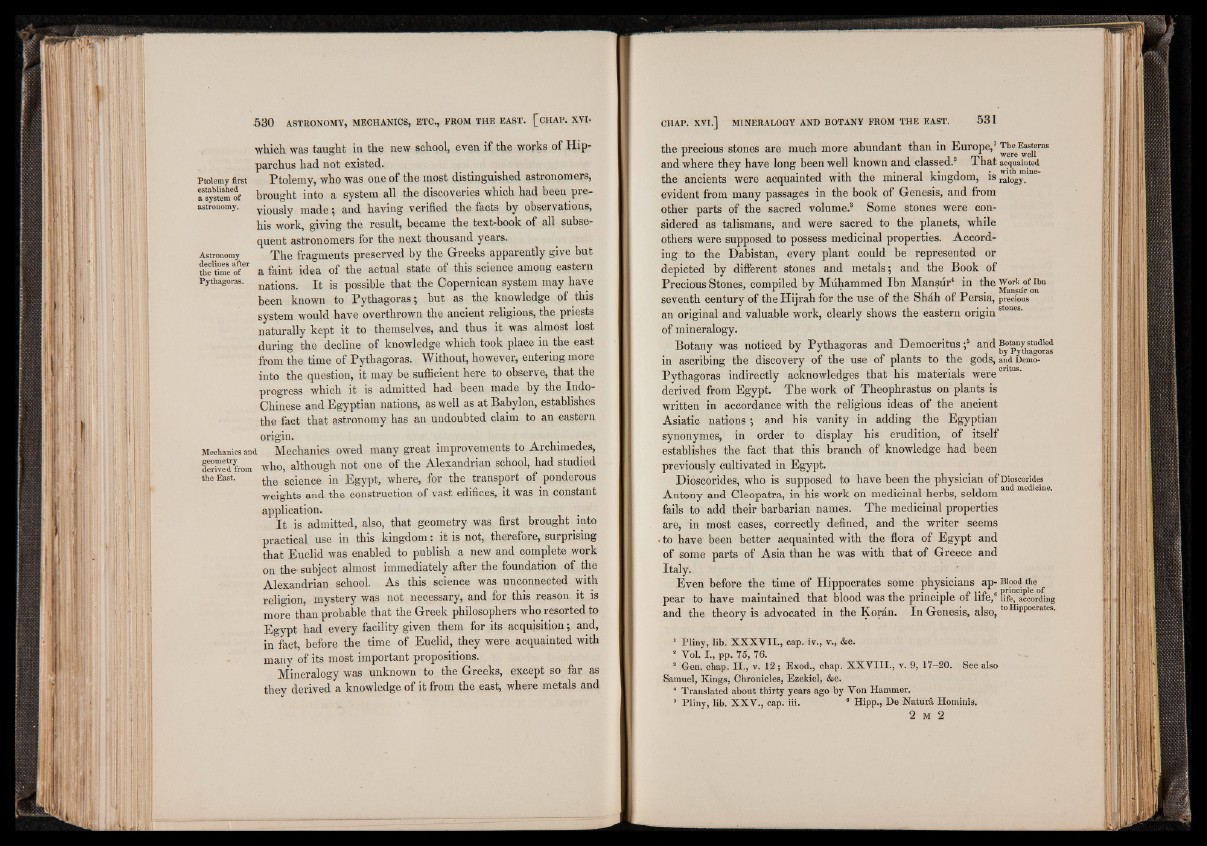
Ptolemy first
established
a system of
astronomy.
Astronomy
declines after
the time of
Pythagoras.
which was taught in the new school, even if the works of Hipparchus
Mechanics ani
geometry
derived from
the East.
had not existed.
Ptolemy, who was one of the most distinguished astronomers,
brought into a system all the discoveries which had been previously
made ; and having verified the facts by observations,
his work, giving the result, became the text-book of all subsequent
astronomers for the next thousand years.
The fragments preserved by the Greeks apparently give but
a faint idea of the actual state of this science among eastern
nations. It is possible that the Copernican system may have
been known to Pythagoras; but as the knowledge of this
system would have overthrown the ancient religions, the priests
naturally kept it to themselves, and thus it was almost lost
during the decline of knowledge which took place in the east
from the time of Pythagoras. Without, however, entering more
into the question, it may be sufficient here to observe, that the
progress which it is admitted had been made by the Indo-
Chinese and Egyptian nations, as well as at Babylon, establishes
the fact that astronomy has an undoubted claim to an eastern
origin,
Mechanics owed many great improvements to Archimedes,
who, although not one of the Alexandrian school, had studied
the science in Egypt, where, for the transport of ponderous
weights and the construction of vast edifices, it was in constant
application.
It is admitted, also, that geometry was first brought into
practical use in this kingdom: it is not, therefore, surprising
that Euclid was enabled to publish a new and complete work
on the- subject almost immediately after the foundation of the
Alexandrian school. As this science was unconnected with
religion, mystery was not necessary, and for this reason it is
more than probable that the Greek philosophers who resorted to
Egypt had every facility given them for its acquisition; and,
in fact, before the time of Euclid, they were acquainted with
many of its most important propositions.
Mineralogy was unknown to the Greeks, except so far as
they derived a knowledge of it from the east, where metals and
the precious stones are much more abundant than in Europe,1 ^^Easteras
and where they have long been well known and classed.8 That acquainted
the ancients were acquainted with the mineral kingdom, is rai0gy.me
evident from many passages in the book of Genesis, and from
other parts of the sacred volume.3 Some stones were considered
as talismans, and were sacred to the planets, while
others were supposed to possess medicinal properties. According
to the Dabistan, every plant could be represented or
depicted by different stones and metals; and the Book of
Precious Stones, compiled by Muhammed Ibn Mansur4 in the Work of ibu n TT.. , p , seventh century or the Hijrah for the use or the o01h a/ih otn tr> ersi• a, pMraecnisouurs on
an original and valuable work, clearly shows the eastern origin6 0Qes'
of mineralogy.
Botany was noticed by Pythagoras and Democritus;6 and
in ascribing the discovery of the use of plants to the gods, and uemo-
Pythagoras indirectly acknowledges that his materials wereonus'
derived from Egypt. The work of Theophrastus on plants is
written in accordance with the religious ideas of the ancient
Asiatic nations ; and his vanity in adding the Egyptian
synonymes, in order to display his erudition, of itself
establishes the fact that this branch of knowledge had been
previously cultivated in Egypt.
Dioseorides, who is supposed to have been the physician of Dioscorides
Antony and Cleopatra, in his work on medicinal herbs, seldom a° m cm '
fails to add their barbarian names. The medicinal properties
are, in most cases, correctly defined, and the writer seems
• to have been better acquainted with the flora of Egypt and
of some parts of Asia than he was with that of Greece and
Italy.
Even before the time of Hippocrates some physicians ap- BnrlomocdiD tlhee of
pear to have maintained that blood was the principle of life,6 iife, according
and the theory is advocated in the Koran. In Genesis, also,t0 Hippocrates.
* Pliny, lib. X X X V I I ., cap. iv., v., &c.
8 Vol. I., pp. 75, 76.
8 Gen. chap. I I ,, v. 12 ; Exod., chap. X X V I I I ., v. 9, 17 20. See also
Samuel, Kings, Chronicles, Ezekiel, &c.
4 Translated about thirty years ago by Von Hammer.
5 Pliny, lib. X X V ., cap. iii. * Hipp., De Natura Hominis.
2 M 2